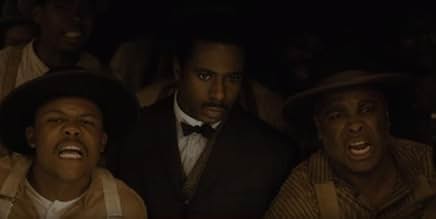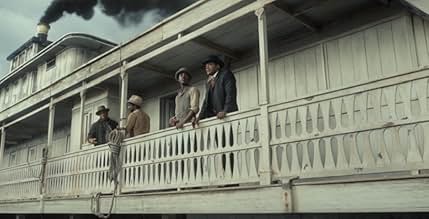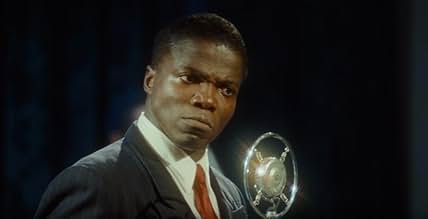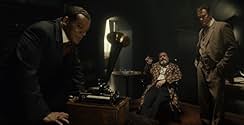A mythical account of the life of Buddy Bolden, the first Cornet King of New Orleans.A mythical account of the life of Buddy Bolden, the first Cornet King of New Orleans.A mythical account of the life of Buddy Bolden, the first Cornet King of New Orleans.
- Awards
- 2 nominations total
Donald Elise Watkins
- Brock Mumford
- (as Donald Watkins)
Featured reviews
"Bolden" will transcend you into a hallucinogenic state and is an interesting approach to the conventional biopic.
In this drama based on a true story, although much of his life remains a mystery, Buddy Bolden becomes the first cornet king of New Orleans.
Overall, "Bolden" isn't for everyone. The film features solid performances from its cast, an excellent score by Wynton Marsalis, but the story can become confusing to viewers. I understand that much of Bolden's life is almost of myth, which is why writer/director Dan Pritzker took the approach he did. A vision of a life that will be underrated, but if you enjoy jazz music and a fresh take on the biopic drama, check out "Bolden".
Go see it or wait to see it at home.
In this drama based on a true story, although much of his life remains a mystery, Buddy Bolden becomes the first cornet king of New Orleans.
Overall, "Bolden" isn't for everyone. The film features solid performances from its cast, an excellent score by Wynton Marsalis, but the story can become confusing to viewers. I understand that much of Bolden's life is almost of myth, which is why writer/director Dan Pritzker took the approach he did. A vision of a life that will be underrated, but if you enjoy jazz music and a fresh take on the biopic drama, check out "Bolden".
Go see it or wait to see it at home.
This is not a Buddy Bolden biography because too little is known about him. This film tells of the legend of Bolden and is filmed like one big nightmare/beautiful dream, sequence. Even though I'm not a big jazz fan, the music was fabulous and I couldn't get enough. Excellent acting on the part of Gary Carr in particular, and the entire cast in general. It also makes you wonder about all the important events, good or bad, that went unrecorded in history. This movie is well worth your time as long as you know what to expect.
Taken from the perspective of Bolden's asylum residency and the reflections of his life, success, frustration and failure, I found the movie at times restless, but overall very interesting. The period sets, costuming, and social tension make the movie work, as the shards of his life and his ambition dovetail into his ultimate failure and loss. In reality, little is known of his music or the facts of his life, but his influence was profound and shaped jazz (jass) music. To do Bolden justice I would be happy to see a proper documentary, but if this movie keeps his accomplishments in our culture's mind then it was a good endeavor. Now go read his Wikipedia page, and listen to some early King Oliver or Louis Armstrong records!
I really wanted to like this film. Buddy Bolden is largely unknown, but his legacy is immense. I love Jazz and love New Orleans and have visited many times- the combination of Jazz, New Orleans and the story of Buddy Bolden had the potential to make a great film, sadly this was not the case.
The facts of Bolden's life are sparse, so there was a lot of room to tell a story. Racism was touched on, but should have been explored more fully. What you get is an impression and very little story telling. The story seems to be told in the first 20-30 minutes of the film, and then just repeated to the end.
I was expecting more of the music, given Wynton Marsalis's involvement, but was again disappointed. There was very little of New Orleans itself in the film- again a missed opportunity.
Overall, extremely disappointing.
Many reviewers must have missed the part of Ken Burns Jazz that centers on most of the roots of the truly American form of music from the last century? Buddy Bolden was the style influencer for Louis "Pops" Armstrong, who grew up in an adopted setting in New Orleans.
Armstrong often heard Buddy Bolden playing on river boats from the river banks into the wee hours of the morning. His adoptive parents recognized the value of music and instrument training early on. When they took Armstrong to select an instrument to learn, they hinted around about a woodwind or string instrument, but Armstrong was already hooked on the Coronet from listening to Bolden and others in the City.
What may be very distracting to some of the viewers is the fact that Bolden was a schizophrenic with hallucinations and deep depression, For this, he was eventually institutionalized. The story is managed as Bolden sees it, eventually from his cell at the asylum that he was interned into. This is not any harder than following about any Quentin Tarantino movie or others which find a way of describing current and past sections of time into 90 or so minutes of film.
This film has the burden of also showing how even the most talented people of color were often taken advantage of by crooked, managers, record companies, theatre owners and other grifters and swindlers in the entertainment industry of the time. I believe they do an exceptional job of placing Bolden within the reach of several unsavory characters beset on separating him from his music and talent in order to pad their own pockets.
Wynton Marsalis wrote and orchestrated the music for this film and likely is the only living human being capable of doing so with the true essence of the time, characters and musical theme of the times. From "Jazz", by Burns et.al., Marsalis explains the voices of the New Orleans sound and the POP of the Bolden style that he was ultimately famous for both as unique and as a major influence to Armstrong, one of Marsalis's iconic performance player. In "Jazz", Marsalis narrative and emotion in discussing these two, Bolden and Armstrong, reveals his feelings for them and their places as Jazz icons of the first degree.
If only they had a scene with Sidney Bechet (1897-1959), the New Orleans sax player that would have been about Bolden's age. Mr. Bechet was a brawler. If he didn't get paid right for a gig, he would take his fee out in damages upon the locale he was playing in. He was also a victim of unscrupulous dealings with the white ownership structure in New Orleans. Early in life, he left the US for Europe where he and many other Jazz musicians of the time went to play to full houses of appreciative, jazz starved fans. Remember, those fans did not yet have records. Live performances were the rage of the time.
What may be very distracting to some of the viewers is the fact that Bolden was a schizophrenic with hallucinations and deep depression, For this, he was eventually institutionalized. The story is managed as Bolden sees it, eventually from his cell at the asylum that he was interned into. This is not any harder than following about any Quentin Tarantino movie or others which find a way of describing current and past sections of time into 90 or so minutes of film.
This film has the burden of also showing how even the most talented people of color were often taken advantage of by crooked, managers, record companies, theatre owners and other grifters and swindlers in the entertainment industry of the time. I believe they do an exceptional job of placing Bolden within the reach of several unsavory characters beset on separating him from his music and talent in order to pad their own pockets.
Wynton Marsalis wrote and orchestrated the music for this film and likely is the only living human being capable of doing so with the true essence of the time, characters and musical theme of the times. From "Jazz", by Burns et.al., Marsalis explains the voices of the New Orleans sound and the POP of the Bolden style that he was ultimately famous for both as unique and as a major influence to Armstrong, one of Marsalis's iconic performance player. In "Jazz", Marsalis narrative and emotion in discussing these two, Bolden and Armstrong, reveals his feelings for them and their places as Jazz icons of the first degree.
If only they had a scene with Sidney Bechet (1897-1959), the New Orleans sax player that would have been about Bolden's age. Mr. Bechet was a brawler. If he didn't get paid right for a gig, he would take his fee out in damages upon the locale he was playing in. He was also a victim of unscrupulous dealings with the white ownership structure in New Orleans. Early in life, he left the US for Europe where he and many other Jazz musicians of the time went to play to full houses of appreciative, jazz starved fans. Remember, those fans did not yet have records. Live performances were the rage of the time.
Did you know
- TriviaBolden's cornet solos were performed by multiple Grammy winner, Wynton Marsalis.
- How long is Bolden?Powered by Alexa
Details
- Runtime1 hour 48 minutes
- Color
- Aspect ratio
- 1.85 : 1
Contribute to this page
Suggest an edit or add missing content






































